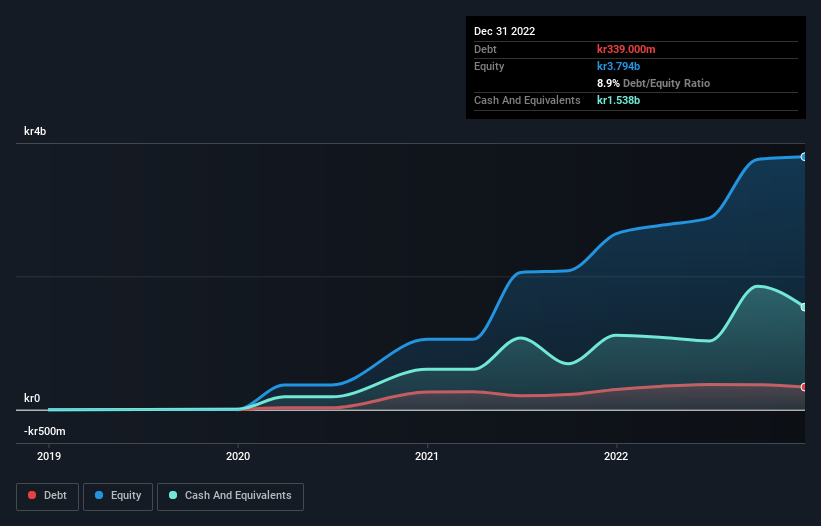Legendary fund manager Li Lu (who Charlie Munger backed) once said, 'The biggest investment risk is not the volatility of prices, but whether you will suffer a permanent loss of capital.' When we think about how risky a company is, we always like to look at its use of debt, since debt overload can lead to ruin. As with many other companies Cloudberry Clean Energy ASA (OB:CLOUD) makes use of debt. But should shareholders be worried about its use of debt?
Why Does Debt Bring Risk?
Debt is a tool to help businesses grow, but if a business is incapable of paying off its lenders, then it exists at their mercy. If things get really bad, the lenders can take control of the business. While that is not too common, we often do see indebted companies permanently diluting shareholders because lenders force them to raise capital at a distressed price. Of course, debt can be an important tool in businesses, particularly capital heavy businesses. The first step when considering a company's debt levels is to consider its cash and debt together.
View our latest analysis for Cloudberry Clean Energy
How Much Debt Does Cloudberry Clean Energy Carry?
As you can see below, at the end of December 2022, Cloudberry Clean Energy had kr339.0m of debt, up from kr304.0m a year ago. Click the image for more detail. But on the other hand it also has kr1.54b in cash, leading to a kr1.20b net cash position.

A Look At Cloudberry Clean Energy's Liabilities
We can see from the most recent balance sheet that Cloudberry Clean Energy had liabilities of kr283.0m falling due within a year, and liabilities of kr526.0m due beyond that. Offsetting these obligations, it had cash of kr1.54b as well as receivables valued at kr52.0m due within 12 months. So it can boast kr781.0m more liquid assets than total liabilities.
This excess liquidity suggests that Cloudberry Clean Energy is taking a careful approach to debt. Due to its strong net asset position, it is not likely to face issues with its lenders. Simply put, the fact that Cloudberry Clean Energy has more cash than debt is arguably a good indication that it can manage its debt safely. The balance sheet is clearly the area to focus on when you are analysing debt. But it is future earnings, more than anything, that will determine Cloudberry Clean Energy's ability to maintain a healthy balance sheet going forward. So if you want to see what the professionals think, you might find this free report on analyst profit forecasts to be interesting.
In the last year Cloudberry Clean Energy wasn't profitable at an EBIT level, but managed to grow its revenue by 410%, to kr209m. When it comes to revenue growth, that's like nailing the game winning 3-pointer!
So How Risky Is Cloudberry Clean Energy?
Although Cloudberry Clean Energy had an earnings before interest and tax (EBIT) loss over the last twelve months, it made a statutory profit of kr118m. So taking that on face value, and considering the cash, we don't think its very risky in the near term. We think its revenue growth of 410% is a good sign. There's no doubt fast top line growth can cure all manner of ills, for a stock. There's no doubt that we learn most about debt from the balance sheet. But ultimately, every company can contain risks that exist outside of the balance sheet. Case in point: We've spotted 1 warning sign for Cloudberry Clean Energy you should be aware of.
Of course, if you're the type of investor who prefers buying stocks without the burden of debt, then don't hesitate to discover our exclusive list of net cash growth stocks, today.
New: AI Stock Screener & Alerts
Our new AI Stock Screener scans the market every day to uncover opportunities.
• Dividend Powerhouses (3%+ Yield)
• Undervalued Small Caps with Insider Buying
• High growth Tech and AI Companies
Or build your own from over 50 metrics.
Have feedback on this article? Concerned about the content? Get in touch with us directly. Alternatively, email editorial-team (at) simplywallst.com.
This article by Simply Wall St is general in nature. We provide commentary based on historical data and analyst forecasts only using an unbiased methodology and our articles are not intended to be financial advice. It does not constitute a recommendation to buy or sell any stock, and does not take account of your objectives, or your financial situation. We aim to bring you long-term focused analysis driven by fundamental data. Note that our analysis may not factor in the latest price-sensitive company announcements or qualitative material. Simply Wall St has no position in any stocks mentioned.
About OB:CLOUD
Cloudberry Clean Energy
Operates as a renewable energy company in Norway, Denmark, Switzerland, and Sweden.
Slightly overvalued with limited growth.
Similar Companies
Market Insights
Community Narratives



